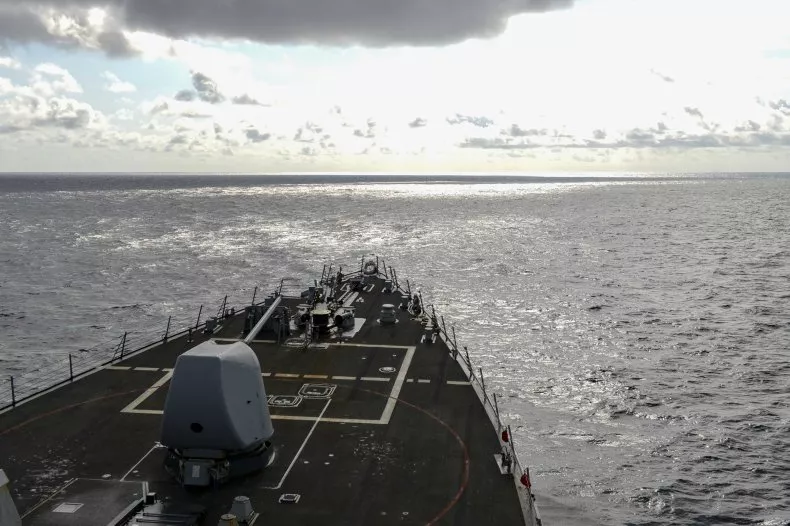Sun Lee
In its latest escalation of territorial assertiveness in the South China Sea, Beijing has unilaterally drawn a new expansive baseline in the northern Gulf of Tonkin, encroaching deep into international waters. This brazen move, which analysts deem excessive and a violation of international law, has rightly drawn protests from Vietnam and raised concerns about the Chinese Communist Party’s (CCP) disregard for maritime rules and norms.
The Gulf of Tonkin, known as Vinh Bac Bo in Vietnamese, is a strategically vital waterway shared by Vietnam and China, having immense economic, defense, and security implications for both nations. In 2000, after years of negotiations, Hanoi and Beijing signed a Maritime Boundary Delimitation Agreement, clearly demarcating each other’s territorial seas, exclusive economic zones, and continental shelves in the Gulf. This landmark agreement was hailed as a model for resolving maritime disputes through diplomacy and adherence to international law.
Yet, the CCP’s recent unilateral action threatens to undermine this hard-won agreement and further escalate tensions in the region. By drawing a new baseline that encroaches up to 50 nautical miles into international waters, Beijing has effectively laid claim to vast swaths of maritime territory that rightfully belong to the global commons. This brazen overreach not only violates the spirit and letter of the United Nations Convention on the Law of the Sea (UNCLOS) but also sets a dangerous precedent for disregarding established maritime boundaries and norms.
The implications of China’s excessive claims are far-reaching and deeply concerning. By asserting its jurisdiction over expanded international waters within the new baseline, Beijing could impede the freedom of navigation and innocent passage, principles enshrined in UNCLOS which are critical to global maritime trade and security. Foreign vessels, including commercial ships and naval craft, could now face restrictions or outright denial of access to these waters, potentially disrupting vital shipping lanes and heightening the risk of confrontation.
Moreover, the new baseline potentially gives China a pretext to push Vietnam into renegotiating the ‘2000 Boundary Agreement’, further eroding the hard-won gains of diplomacy and escalating regional tensions. Such a move would not only undermine the credibility of existing maritime agreements but also embolden Beijing’s revisionist ambitions, setting a dangerous precedent for other disputed territories in the South China Sea and beyond.
The CCP’s justification for this excessive maritime claim – asserting national sovereignty and jurisdiction – rings hollow and betrays a disturbing disregard for international law and the rights of other nations. By unilaterally redrawing boundaries and encroaching on shared waters, Beijing is essentially attempting to rewrite the rules to suit its own narrow interests, undermining the very foundation of the rules-based international order.
Crucially, China’s actions in the Gulf of Tonkin are part of a broader pattern of aggressive behavior in the South China Sea, where Beijing has systematically militarized artificial islands, intimidated regional neighbors, and made sweeping territorial claims that flagrantly disregard international law. From the Paracel Islands to the Spratly archipelago, the CCP has repeatedly demonstrated its unwillingness to respect the sovereign rights and interests of other nations, fueling regional instability and eroding trust in its commitment to peaceful resolution of disputes.
The international community cannot afford to turn a blind eye to China’s provocative actions in the Gulf of Tonkin. Acquiescing to Beijing’s excessive maritime claims would set a dangerous precedent, emboldening the
CCP to escalate its revisionist ambitions and further undermine the rules-based order that has underpinned regional peace and prosperity for decades.
A strong and unified response is imperative. Vietnam and other nations affected by China’s overreach must resolutely protest and bring international attention to this issue, raising it through bilateral channels and multilateral forums. The United States, as a staunch defender of freedom of navigation and a crucial player in the Indo-Pacific region, should consider conducting freedom of navigation operations to physically challenge China’s excessive claims and affirm its commitment of upholding international maritime law.
Furthermore, the international community must explore avenues for strengthening the enforcement mechanisms of UNCLOS and other international legal frameworks governing maritime affairs. Failure to hold Beijing accountable for its transgressions will only embolden its disregard for established norms and further erode the credibility of the rules-based order.
The CCP’s actions in the Gulf of Tonkin are a stark reminder of the regime’s growing assertiveness and its willingness to undermine international law and regional stability in pursuit of its narrow, revisionist ambitions. By drawing an excessive baseline and encroaching on international waters, Beijing is not only challenging the sovereignty and rights of regional nations but also posing a direct threat to the freedom of navigation – a principle that underpins global maritime commerce and security.
The international community must stand united in defense of the rules-based order and the principles of freedom of navigation and respect for international law. Acquiescing to China’s excessive maritime claims would set a dangerous precedent and embolden the CCP’s revisionist agenda, further destabilizing the Indo-Pacific region and undermining the foundations of the international system. It is time for a firm and principled response, one that upholds the shared values of sovereignty, territorial integrity, and the peaceful resolution of disputes.
Sun Lee is the pseudonym of a writer who cover Asian affairs.
The views expressed do not necessarily represent the views of Mizzima Media Group.
eng.mizzima.com

